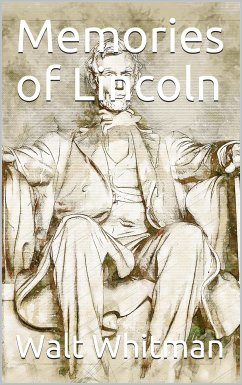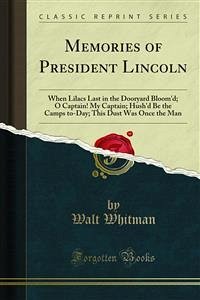Whitman did not subject Lincoln to the literary but to the human motive. Lincoln does not become a literary figure by his touch. Does not become a man in a book. After Whitman is done with him Lincoln still remains Lincoln. No way reduced. No way aggrandized. Only better understood. His background does not become a book. His background remains what it was. Remains life. Generic life. As life is where life finds life at the root. I may let Whitman put in a word for himself. Whitman said to me of Lincoln:
"Lincoln is particularly my man—particularly belongs to me; yes, and by the same taken I am Lincoln's man: I guess I particularly belong to him: we are afloat in the same stream—we are rooted in the same ground."
To know the Lincoln of Whitman you want to know the Whitman of Whitman. Whitman was literary. But he was not first of all literary. Or last of all literary. First of all he was human. He was not the leaves of a book. He was the bone and flesh of a man. Yes, he was that something or other not bone or flesh which is also of a man—which finally is the man. Simply literary analysis can make little out of Whitman. He does not yield to the scalpel. He is not to be resurrected from an inkpot. His voice falls in with the prophet voices. He was not unlettered. He knew the alphabet. But he kept all alphabetical, arrogance well in hand. The letter was kept in hand. The spirit was left free. You cannot buy a ticket for Athens or Weimar or Paris or London or Boston and reach Whitman. He is never reached in that circle. The literary centers do not lead to him. You have got to travel to him by another route. You go East and find the Buddhistic canticles. You consult the Zoroastrian avatars. And you take the word of Jesus for a great deal.
Whitman is therefore the best route to Lincoln.
"Lincoln is particularly my man—particularly belongs to me; yes, and by the same taken I am Lincoln's man: I guess I particularly belong to him: we are afloat in the same stream—we are rooted in the same ground."
To know the Lincoln of Whitman you want to know the Whitman of Whitman. Whitman was literary. But he was not first of all literary. Or last of all literary. First of all he was human. He was not the leaves of a book. He was the bone and flesh of a man. Yes, he was that something or other not bone or flesh which is also of a man—which finally is the man. Simply literary analysis can make little out of Whitman. He does not yield to the scalpel. He is not to be resurrected from an inkpot. His voice falls in with the prophet voices. He was not unlettered. He knew the alphabet. But he kept all alphabetical, arrogance well in hand. The letter was kept in hand. The spirit was left free. You cannot buy a ticket for Athens or Weimar or Paris or London or Boston and reach Whitman. He is never reached in that circle. The literary centers do not lead to him. You have got to travel to him by another route. You go East and find the Buddhistic canticles. You consult the Zoroastrian avatars. And you take the word of Jesus for a great deal.
Whitman is therefore the best route to Lincoln.









